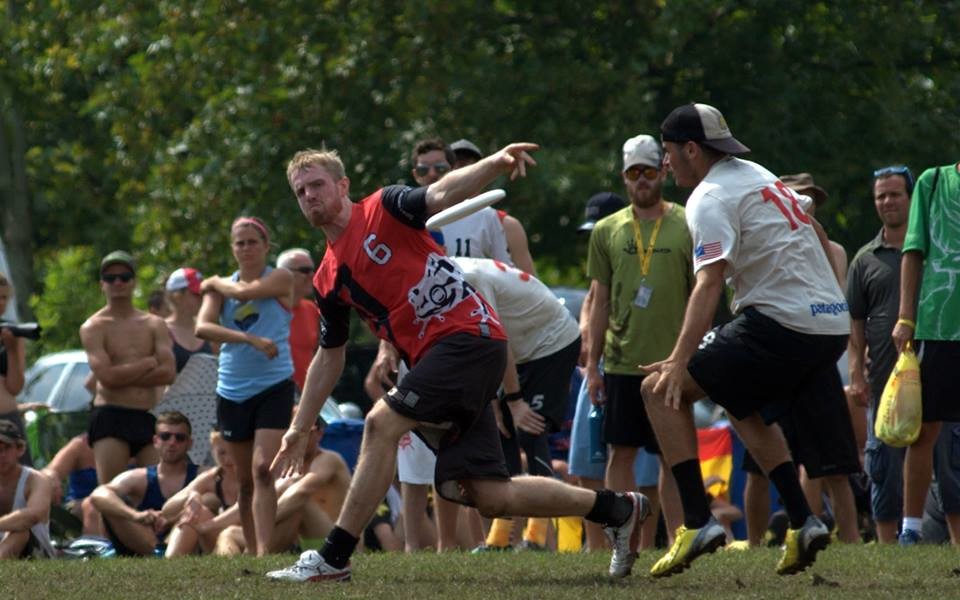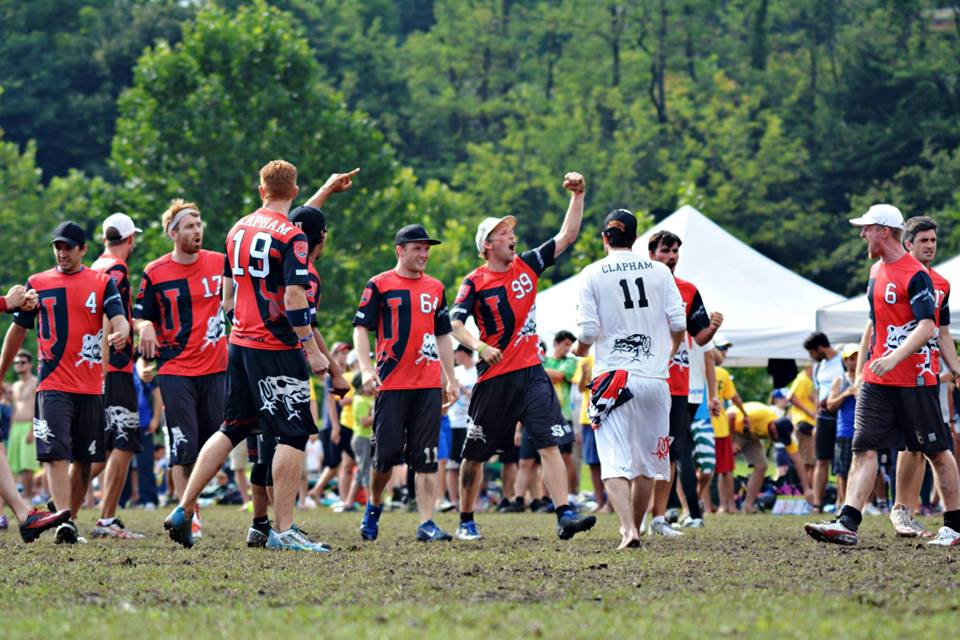
In this interview, I chat with former co-coach (now player) of London’s Clapham, Cian O’Morain, about the history of the team and their striving to be not only the best team in Europe but the best in the world.
How long have you been playing for Clapham?
Cian: I first joined Clapham in January 2009. I had recently moved to the UK to do a Masters and was looking for a team. Being half way between Manchester and London at the time I was considering both Clapham and Chevron, but when I was at home over Christmas Fergus (Weldon) convinced me to come down to London and see how I liked it at Clapham. I’ve been there ever since!
Would it be fair to say that there is a Clapham mentality/culture that is passed on to new players & so enables the flame to be passed on?
I think it is fair to say that there is a Clapham mentality, which enables the club to continue to be strong as people come and go. That’s not to say that the culture and emphasis points of the club haven’t changed over the years – the fact that we’re in London means that we benefit from a constant influx of new talent and ideas – however, underlying that there is a single-minded work ethic and confidence which acts as a bedrock to what we do. How that is passed on from one generation to the next is principally based on the more senior players at the club setting that example and it rubbing off on newer players. In particular, if you look at the last 8 years or so of the club’s history, Clapham have benefited from having first Rob ‘Randy’ Alpen and then Marc ‘Britney’ Guilbert as the spiritual leaders of the club. Having leaders like that is not to be underestimated.
I ask this because there is a lineage of Clapham based ultimate that now goes back at least 25 years – I played/trained on Clapham common with predecessors, ’91 – 93, and even in the last decade/15 years, the team has kept winning while the personnel has changed.
When you look back, it is a long history of the club (in its different guises) finding ways to win. Long may it continue!
At the same time the level of achievement has increased and Clapham’s success across Europe is much wider than it was previously.
The past few years have indeed seen us take another step in terms of our dominance in Europe. Though I would say that the team of 2004/2005/2006 was also very successful on this stage. However, by 2007 the core of what that team had been had fallen away so the club had to rebuild itself. It took us a few years of building and figuring out (with a number of sudden death losses) before the current team found it’s stride and since then we’ve been at a different level in Europe.
Cracking North America seems the logical step after winning in Europe. Is this still the goal? And is the Clapham strategy still to raise their game by going across the Atlantic?
Clapham’s bar has, for the past few years, been set at the global level. An important part of that goal is to show that we can take care of the house by consistently dominating in Europe, but the bar is certainly set higher than that. And if you look at our performances over the past 2 years at the global stage – Chesepeake in 2013, the US Open in 2014 and WUCC in 2014 – that’s clearly our level.
One key part of that is to continue to travel to the US so that we can play those teams as often as possible. The one biggest advantage that these teams have against us is the frequency of competitive games they get to play against other top teams. They will play maybe 20 – 30 competitive games against the right type of opposition a year, whereas we will get maybe 8-10 if we make a trip to the US. Even at this point, we will have the additional challenge of getting our full team across the water to attend any such tournament (our roster at the US Open last year was heavily depleted – myself included).
[By the way, it’s worth pointing out again that the 2005 team did also peak in the semis of a top US tournament, beating many top 16 teams along the way. So this isn’t a new phenomenon]

Is the challenge just due to the depth of numbers playing the game in the US, or other factors too?
The depth of the talent pool is clearly a significant factor in the advantage the US clubs have over others. However, if you compare Clapham to each individual club over there, it isn’t such a big problem. Each city club (like Clapham in London) is building a programme which attracts players from all around. And although a club like Revolver in SF will have a bigger pool of players to pick from than we do in London, the pool of elite players (I don’t think) is too different.
For me, the biggest challenge that Clapham faces versus the US teams is what I mentioned above. They just get to have more practice at playing close competitive games versus teams at a similar level. That’s life though!
What impact do you think the new AUDL & MLU pro leagues are having on club ultimate?
I’m not to sure to be honest as I don’t really follow the two leagues, so take this with a pinch of salt. My guess would be that, on the positive side, the leagues are providing added opportunities for these players to be participating in high level games, further driving quality and poise. I suspect they are having some negative impact on clubs also, as players may experience burn-out. Playing in one of these leagues and then going into the US club season makes for a very long a grueling season for an individual player. For those of us from the GAA world [before playing ultimate I was part of a Dublin Minor team that won the Leinster Championship and lost the All-Ireland in a replay], I imagine there is a comparison to GAA player burn-out, as players are pulled in multiple directions.
It’s interesting that some players are playing both. Are any UK based players on rosters, or looking to try out for future drafts?
I don’t think so. The logistics of it all would be too difficult.
What about you, have you considered moving to the US to play?
Not actively, no. If my life had brought me to live in the US, I would of course have played but it wouldn’t have been the other way around. Perhaps it helped having such a strong club in London to keep my attention.
How about Canada, why do they punch above their weight (or is it like NZ & rugby, where it’s simply played by a lot of people), and/or also helped by proximity to US?
I’m not sure if they do punch above their weight actually. First off, the player base is very strong in Canada also. Second, it was really only the dominance of Furious George rather than the entire country. I think it’s important to view the success of different teams in North America at a club/city level. Furious George winning a number of US Championships should be viewed as a Vancouver club becoming dominant. Before Vancouver, it was Santa Barbara (Condors). After it was Seattle (Sockeye), then San Fran (Jam/Revolver), with a few others mixed in. Toronto (GOAT) may get there in the future. So I think they punch at their (very good) weight.
GB have risen to #3 in global WFDF ratings, and played out the WCBU open final against US, and last WFDF final too – how far off is actually winning the open section?
It’s hard to say. Taking aside the beach event – in fairness, there’s still a gulf between the game on grass versus the game on sand – and the 2012 result where GB didn’t beat the US, Canada or Japan but managed to make their way to the final, I still think that the gap is closing. The Clapham programme over the past few years has shown that. The key, in my opinion, really comes down to GB’s ability to assemble its strongest team and then to train on a regular basis. Practice, as they say, makes perfect and given the fact that the North American teams will always have teams that are at least as strong athletically as a GB team, they need to be able to cash in on being a better team as a result of having prepared better. This of course has been a topic of much debate in the UK over the past six months :)
Would you say that UK ultimate remains competitive despite Clapham’s long run of success? (Chevy winning European clubs was a nice surprise)?
Chevy winning EUCF in 2009 wasn’t really a surprise if you look at the players that they had at the time (though I do think that our wearing Skogs out in the semis certainly helped their cause!). Depending on how you look at it, UK ultimate has become more competitive. Clapham have continued to win but at the same time more clubs have emerged who are competing to be in the top 4. Look at how EMO have developed over the past few years. With regards to Clapham’s dominance, I would view it more as us getting better at a faster rate than the others have been improving, rather than other teams moving backwards. If that makes sense?
Should they apply the Brian McDevitt principle of evening out the teams if it gets too lop-sided?
Did Brian have a principle of making teams even?
There are arguments for having a centrally planned system, where teams are kept at a similar level. To return to my earlier point, the benefits of playing lots and lots of competitive games against teams at a similar level are great. However, the reality of such an approach aren’t realistic/practical. Given it’s an amateur sport, it’s not really fair to tell people who they can and can’t play for. The answer, I think, lies in helping the ‘challenger’ clubs forge an identity such that their best players don’t want to leave to play for another club, rather they’d want to stay and build their current clubs to be the next Clapham.
What’s next for Clapham?
Next up for Clapham is to build on last year’s performance. If we can play at our current high level for maybe 5% longer in a given game, I think that’ll be enough to beat pretty much any team. The key to this will lie in how successfully we continue to get our whole team to training.
Anything you’d like to add / I should have asked you?
You might have asked what has been the biggest difference between Clapham’s performances in the past couple of years versus the years before that. The single answer is a very simple one. Perhaps for the first time we managed to get the majority of the members of our club to train together twice a week at a high level. Sorry to sound like a broken record, but it’s a very simple equation: show up to (well prepared and run) training sessions as a club and you can’t help but improve.









Comments Policy: At Skyd, we value all legitimate contributions to the discussion of ultimate. However, please ensure your input is respectful. Hateful, slanderous, or disrespectful comments will be deleted. For grammatical, factual, and typographic errors, instead of leaving a comment, please e-mail our editors directly at editors [at] skydmagazine.com.